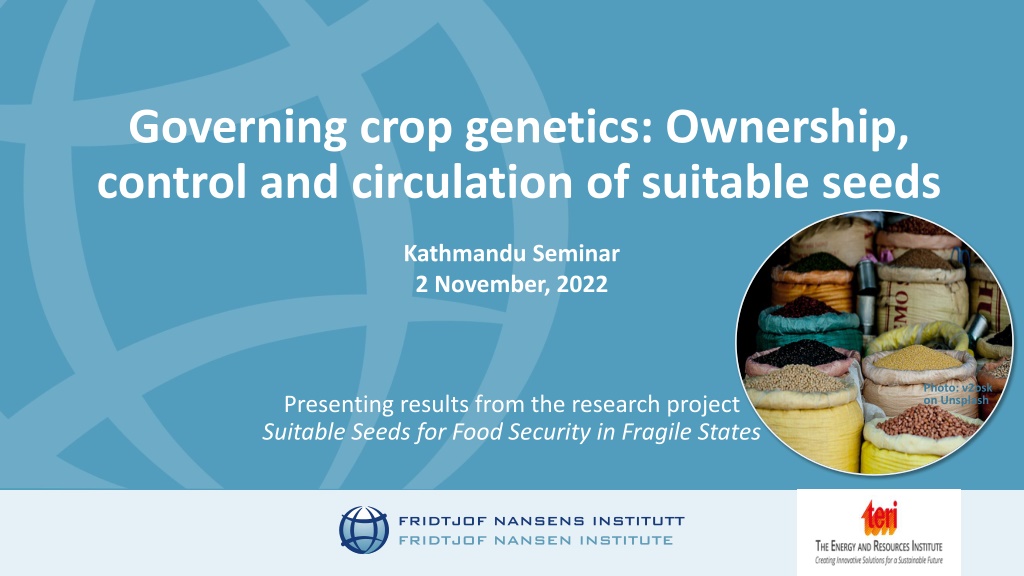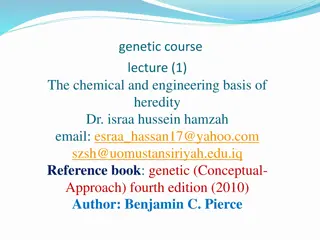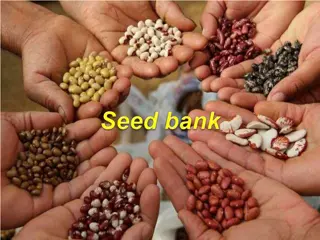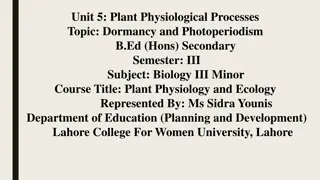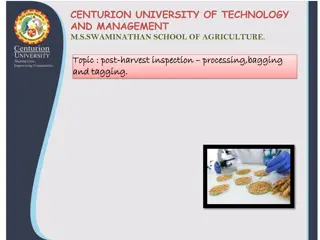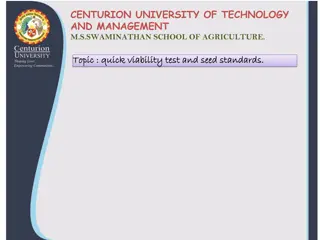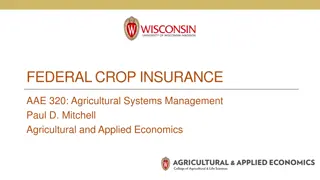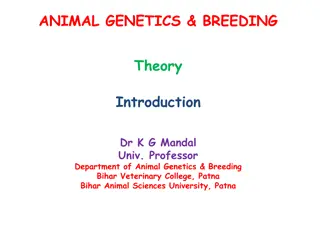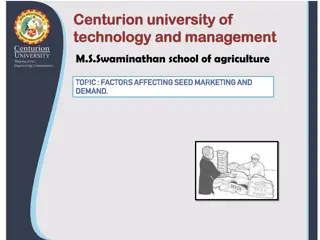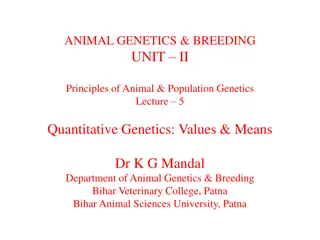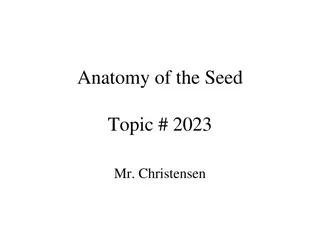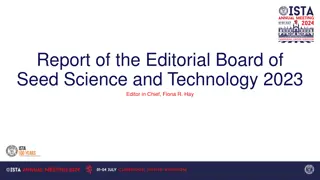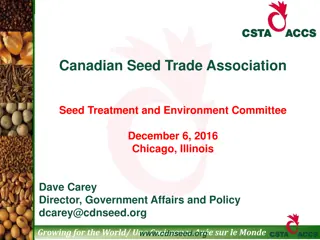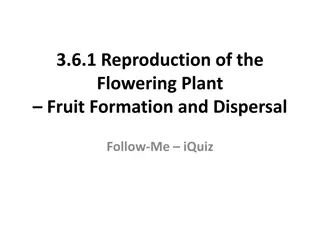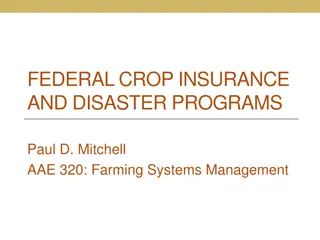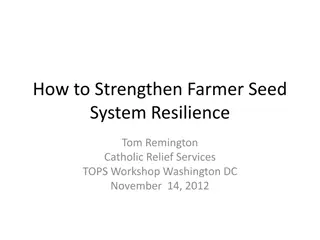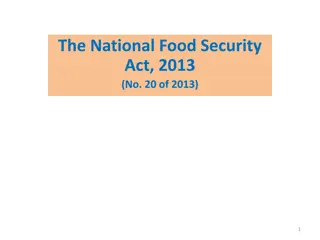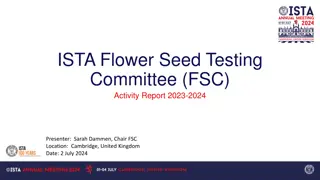Exploring Seed Governance and Crop Genetics for Food Security
Diving into the dynamics of seed ownership, control, and circulation for sustainable agriculture and food security in fragile states, this research project sheds light on the impacts of regulated germplasm exchange and seeds legislation. Discussing themes such as diversity in plant breeding, international regulations, benefit sharing, and the interplay between domestic and international seed transactions, the seminar presents crucial insights on ensuring access to diverse seeds for global breeding efforts and the challenges faced in balancing the needs of different stakeholders.
Download Presentation

Please find below an Image/Link to download the presentation.
The content on the website is provided AS IS for your information and personal use only. It may not be sold, licensed, or shared on other websites without obtaining consent from the author. Download presentation by click this link. If you encounter any issues during the download, it is possible that the publisher has removed the file from their server.
E N D
Presentation Transcript
Governing crop genetics: Ownership, control and circulation of suitable seeds Kathmandu Seminar 2 November, 2022 Photo: v2osk on Unsplash Presenting results from the research project Suitable Seeds for Food Security in Fragile States
Regulated Germplasm Exchange: Impacts on Seeds Legislation in India Kathmandu seminar. Project on Suitable seeds 2 November, 2022 Photo: v2osk on Unsplash Vibha Dhawan (TERI), Arvind Kapur (Acsen HyVeg), Kritika Khanna (CABI), Kristin Rosendal (FNI)
Dr Vibha Dhawan, TERI, India; Plant Biotechnology Dr Arvind Kapur, Acsen HyVeg; plant biochemistry Kritika Kanna, CABI; Economics and business management Dr Kristin Rosendal, FNI; research professor in political science Authors
Introduction Diversity and germplasm exchange in plant breeding Analytical and methodological approach International regulations and actors Domestic seeds legislation ABS, MLS and IPR impacts (benefit sharing, access, innovation) Summary Content
Access to diversity for breeding global interdependence Secure funding for plant breeding innovation IPR affects germplasm exchange: Informal and formal exchange of seeds Governments must balance needs for domestic and international seeds transactions Impacts on germplasm exchange in plant breeding
Significantly reduced lost over the last century 90% of our food, energy & protein is sourced from 15 crops & 8 animal species Wheat, rice & maize provide 50% of the plant-based energy intake Biodiversity in Agriculture
Rich source of macro and micro- nutrients showing Reduction in the area under cultivation Low yields Lack of price incentive Subsidized supply of five cereals Consumer preferences Millets
Impact of Climate Change is visible Varieties more tolerant to the extremes of environmental conditions Use of Molecular tools to accelerate the pace Plant Breeding Innovations
Restricted movement of germplasm IPRs associated with new technologies Challanges
Bayer (which acquired Monsanto) Corteva (merger between Dow & DuPont) Syngenta (acquired by Chem China) Three large MNCs in seed Holds about US$ 21.8 billion of the total US$ 42.8 billion global seed market value
In the crops for seed production, the private sector will play a significant role both in efficiency and in technological development in breeding. Public sector continues to play a role in pre-breeding in ensuring equity in access to, and in conserving the basic gene pool. Global reality
Market size is 3-6 billion USD 70% market is of hybrids Wheat and rice are open-pollinated Cereal seed sale is largely administered by the Government Vegetable seeds are produced by Private Sector Informal exchange of germplasm at the field / local level is prevalent and has a provision in the Seed Act (2019) Seed system in India
India has attained Food Security, but malnutrition still remains a challenge Climate change will have a negative impact on food productivity Ground water depletion is an emerging challenge Challenges
International Regulations controlling Germplasm exchange Convention on Biological Diversity The Cartagena Protocol on Biosafety The Nagoya Protocol on access and benefit sharing International treaty on Plant Genetic Resources for food and Agriculture Trade related aspects of Intellectual Property Right (TRIPs Agreement)
Indian Seed Act of 1966 The Seed Bill 2019 National Legislation
The National Biodiversity Authority (NBA)
Protection of Plant varieties and Farmers Right Act (PPV & FR) 2001
Biodiversity-rich Challenges due to IPRs in developing countries vrs. Technology rich
Process Dependent on large number of technologies protected by large number of patents
Not available to those who need the most Orphan crops remain neglected
New technological innovations are extremely risky and expensive Companies need to recover their investments and earn profits
National registry of newly developed varieties is essential (only) for private sector organizations (not for the public sector) DUS (Distinctness, uniformity & stability) testing required for Private sector Hybrids can be sold without any registration (barring Maharastra & Andhra Pradesh) States / Center have limited knowledge of commercial seeds being sold) with no knowledge of parental lines. Contrasting Rules for Private and Public sector institutions for the release fo varies
New Seed Bill, the hybrids will have to be registered with passport data (including parentage)
Goals: safeguard traditional knowledge & stimulating sustainability and innovation Plant breeders need IPR protection of genetic material to stimulate innovation and secure returns from investments in genetic improvement Farmers and breeders need affordable and equitable access to genetic resources for food production and further innovation How to balance IPR protection, equity & access - and meet goals for agriculture? Goals for plant breeding and food security
The two contrasting analytical assumptions: trust or conflict? Low corporate compliance with ABS and MLS The trust needed for MLS vs need for R&D investments in agricultural sector Indian seeds legislation responding to dilemmas and balancing needs Summing up
A multidisciplinary study Political science and genetics Methodology and analytical approach Two analytical perspectives on international-domestic interaction Complexity and conflict: private rights (IPR, patents) Complexity and cooperation: Equity and benefit sharing (ABS)
The Convention on Biological Diversity (CBD) and its Access and Benefit Sharing regime (ABS) FAO International Treaty on Plant Genetic Reources for Food and Agriculture (Plant treaty) World Trade Organization and its TRIPS Agreement (trade related aspects of intellectual property rights) International regulations
Three seed corporations account for 50% of the value of the global seed market. These are: Bayer (which aquired Monsanto in 2018), Syngenta (aquired by ChemChina in 2017) and Corteva (merger between Du Pont and Dow) International seed markets and actors
Indian Seed Act (1966): seeds certification Seed Bill (2019): seed standards; farmers exempted for use The National Biodiversity Authority: ABS legislation in line with CBD counter external misappropriation PPV&FR: Protection of Plant Varieties and Farmers Rights Act (sui generis): in line with WTO/TRIPS, relation to FAO MLS? Domestic Seeds Legislation
Balancing need for R&D, global and domestic access to food security, and benefit sharing Traditional knowledge of crops vs push for high productivity MLS: Germplasm deposited with international centres (26,523 accessions of Annex 1 crop seeds) PPV&FR: plant breeders rights may remove it from the FAO MLS Jury still out on effects of IPR, MLS and ABS ABS, MLS and IPR impacts:
